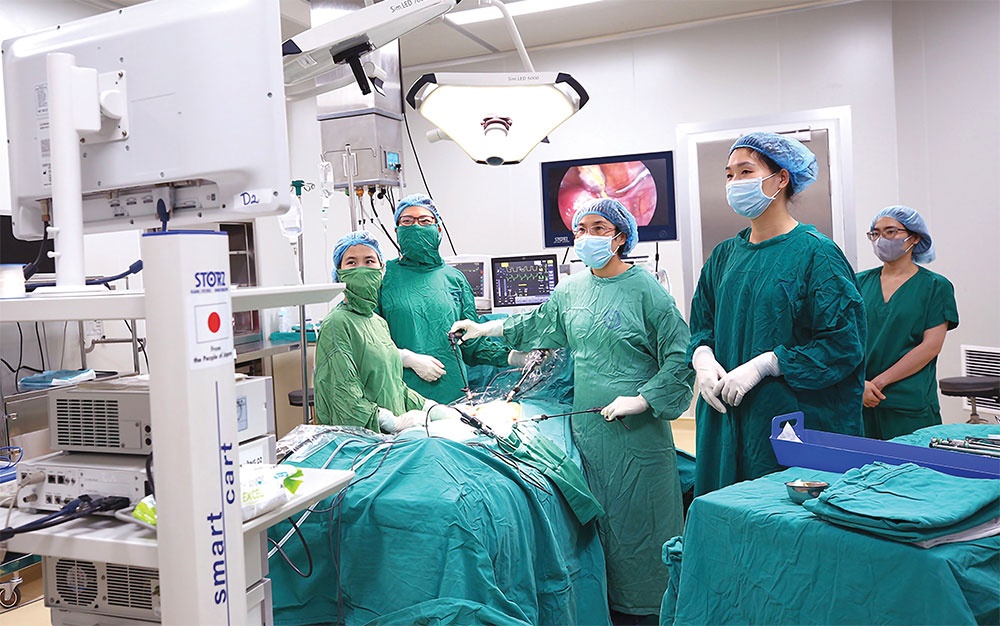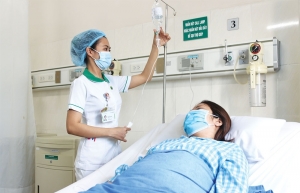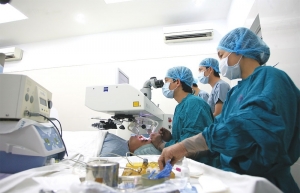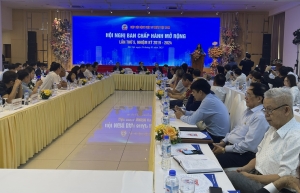Hospitals benefiting from double revision
 |
| Some medical machines had expired contracts but are now back in use, photo Le Toan |
Until recently, the 256-segment computerised tomography system had been unused for months, as it is classed as joint venture equipment with an expired contract. However, use of the system was restarted after Decree No.07/2023/ND-CP and Resolution No.30/NQ-CP both came into being in the first week of March.
The system is one of many medical devices either under joint venture contracts or donated to hospitals that have been put back into operation again thanks to the new legislation, thus enabling Bach Mai, one of the biggest hospitals in Hanoi, to better help patients.
Vu Dang Luu, the hospital’s radiology director, said, “In the past when such a machine was unused, we found it difficult to test patients with coronary artery disease in an accurate and efficient manner. Being allowed to use it again has helped us a lot.”
The new rules have helped the healthcare sector nationwide. In particular, with Decree 07, more than 10,000 registration numbers of drugs, medical supplies, and chemicals have been licensed for circulation, making bidding more convenient.
Bach Mai Hospital director Dr. Dao Xuan Co added, “Many bidding packages of chemicals worth billions of VND (hundreds of thousands of US dollars) have been opened successfully. At present, we have enough supply of chemicals for testing and treatment activities, and the supply of medical supplies is also ensured.”
Elsewhere, in the northern province of Phu Tho, more than 2,000 items including drugs, medical supplies, and chemicals in five bidding packages of the local health sector have closed. In 2022, many items did not have any contractors, but this year the number of participating contractors is substantial.
A representative of Phu Tho Department of Health said the results of these bidding packages will ensure enough supply for the province’s medical treatment activities.
Phu Tho has enjoyed a donation of 28 testing machines. In the past, tests carried out on these machines would not be paid for by health insurance because it would take too long to complete procedures to confirm ownership, while investing in such a machine would be too costly; therefore, the issuance of Resolution 30 has solved this issue.
Decree 07 also emphasises the resolution of problems related to import permits and registration numbers of medical equipment, while removing the regulation that reference prices shall not be higher than the declared prices at the time of procurement; switching from pre-inspection to post-inspection associated with the responsibility of enterprises; and strengthening inspection and examination by management agencies.
In addition, the resolution abolishes the requirement to have three quotations. Machines under placement, borrowed, donated, and those that have expired joint venture contracts will be paid for by health insurance.
In spite of the improvements, many health establishments are still concerned. For example, it requires that the scientific council at hospitals must be responsible for the selection of medical equipment and drugs, no matter how many quotes have been made available.
A Bach Mai hospital representative expects that there will soon be legal documents on management, procurement guidelines, and transparent bidding to ensure a safer legal corridor with sustainable solutions when implementing bidding packages, avoiding shortages of drugs and medical supplies.
Medical facilities also suggested that it is necessary to post the winning price of provinces and units on the portal of the Ministry of Health as a basis, as well as the reference price. Ministry leaders said that they have consulted health departments and hospitals about problems in bidding and would submit them to the National Assembly when amending the Law on Public Procurement this month.
 | Hospitals look for way out over cost traps in tender rules Hospitals and medical equipment suppliers are looking to get back on the right track with the Ministry of Health hoping to solve price issues when it comes to tender rules of medical supplies. |
 | Hospitals bemoan autonomy trial flop After a trial period of two years, state-owned central hospitals are seeking to cease comprehensive autonomy because of financial challenges and legal complications, urging more legal changes ahead. |
 | Hospital autonomy success hangs on fixes Despite amendments, there are calls for legislation on medicine and treatment in Vietnam to receive valuable changes to facilitate hospital autonomy and pave the way for state-run hospitals to get out of existing impasses. |
 | Private facilities urged to do more to boost healthcare sector Minister of Health Dao Hong Lan has asked private-run healthcare facilities to contribute more to policymaking, diagnosis and treatment, private healthcare and preventive health. |
What the stars mean:
★ Poor ★ ★ Promising ★★★ Good ★★★★ Very good ★★★★★ Exceptional
Themes: Healthcare Platform
- PM outlines new tasks for healthcare sector
- Opella and Long Chau join forces to enhance digestive and bone health
- Hanoi intensifies airport monitoring amid Nipah disease risks
- Cosmetics rules set for overhaul under draft decree
- Policy obstacles being addressed in drug licensing and renewal
Related Contents
Latest News
More News
- PM outlines new tasks for healthcare sector (February 25, 2026 | 16:00)
- Myriad risks ahead, but ones Vietnam can confront (February 20, 2026 | 15:02)
- Vietnam making the leap into AI and semiconductors (February 20, 2026 | 09:37)
- Funding must be activated for semiconductor success (February 20, 2026 | 09:20)
- Resilience as new benchmark for smarter infrastructure (February 19, 2026 | 20:35)
- A golden time to shine within ASEAN (February 19, 2026 | 20:22)
- Vietnam’s pivotal year for advancing sustainability (February 19, 2026 | 08:44)
- Strengthening the core role of industry and trade (February 19, 2026 | 08:35)
- Future orientations for healthcare improvements (February 19, 2026 | 08:29)
- Infrastructure orientations suitable for a new chapter (February 19, 2026 | 08:15)

 Tag:
Tag:



















 Mobile Version
Mobile Version